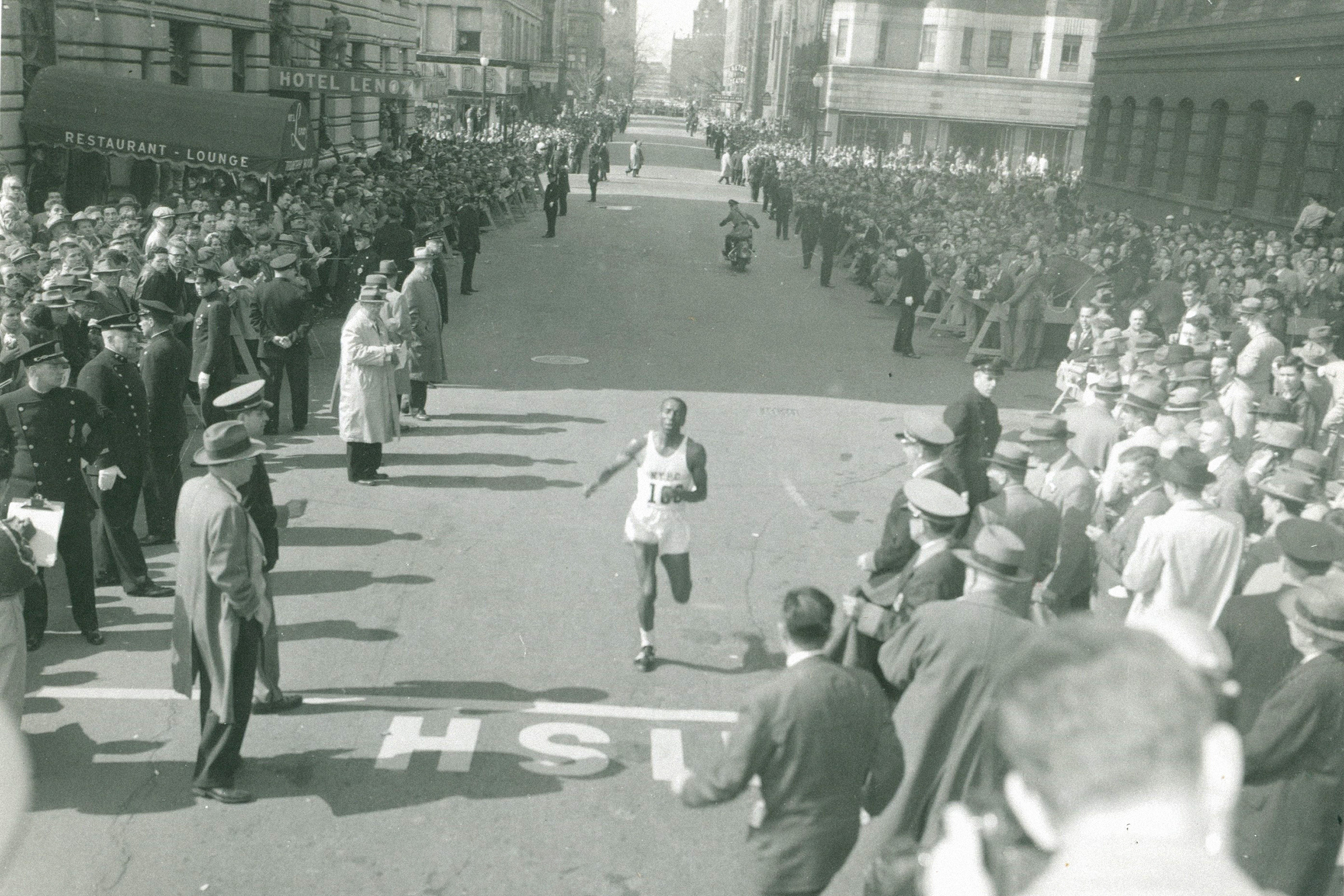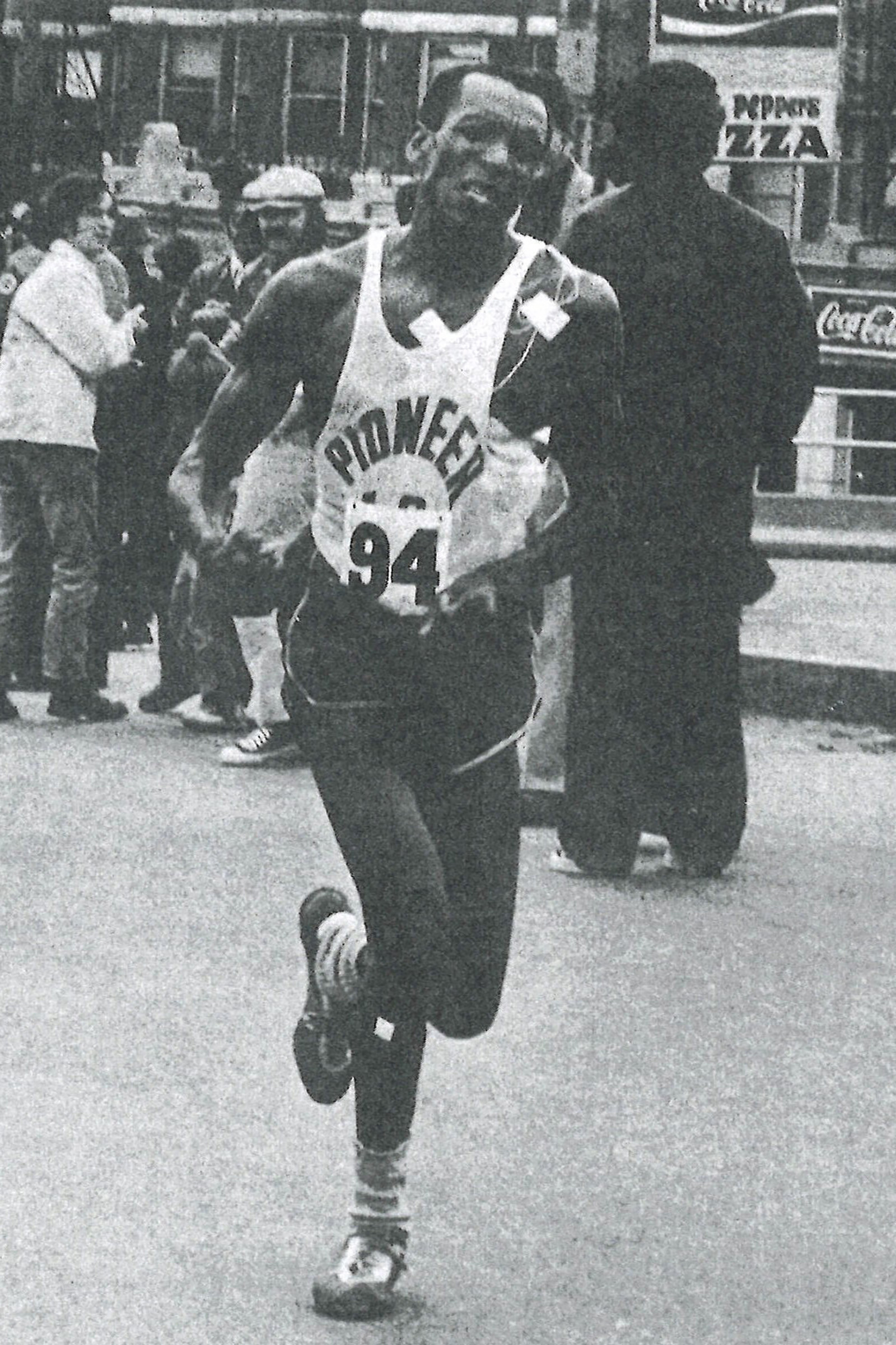
50 Years Since Ted Corbitt
Last Graced the Boston
Marathon Course
WORDS BY SARAH FRANKLIN
On April 15, 1974, Ted Corbitt crossed the Boston Marathon finish line in 310th place with a time of 2:49:16. At 55 years old, this marked Corbitt’s 22nd and final Boston, bookending his 24-year legacy of Boston Marathon consistency with sub-2:50s in his first and final conquests of the course.
Twenty three years earlier, Corbitt, then a newcomer to the marathon distance, toed the line of the 55th Boston Marathon with the noble aspiration of completing the race in less than three hours. Corbitt, who excelled in the 440 meter, 880 meter, mile, relay, and cross-country races in college, had extra time on his hands after receiving his master’s degree in June 1950. His thoughts kept returning to a newsreel he had seen years before about Ellison “Tarzan” Brown, a Narragansett Indian who set an American marathon record on the famed Boston course in 1939. Corbitt wondered if he, too, could race 26.2 miles, and he vowed to test his resolve the following April in Boston.
In an era without training plans or evidence-based long-distance running strategies, preparing for a marathon was more about experimentation than exactitude. Thus, Corbitt – always one to tinker and trial – set a preliminary training goal to run 30 miles nonstop. After many failed attempts, he noticed that he would start to wane after 15 miles and completely hit the wall around 20 miles, which he ultimately attributed to dehydration. Once he started strategically leaving water along his route, he met his 30-mile goal in late February 1951.
In the remaining weeks before the Boston Marathon, Corbitt alternated daily workouts for endurance (two hours of road running) and speed (440 meters fast followed by 220 meters slow) – sometimes, inspired by the boundless Czech long-distance running pioneer Emil Zátopek, in combat boots to increase the difficulty and build leg strength. This type of intense, unconventional training would come to define Corbitt’s distinguished distance running career.
After nearly a year of punishing preparation, Corbitt, at age 32, finished the 1951 Boston Marathon in 15th place, emphatically eclipsing his three-hour goal by crossing the line in 2:48:42.

In the biography Corbitt, John Chodes describes Ted’s first Boston finish:
“As he turned onto Exeter Street and the finish line, he was on the verge of staggering, but he had made it. He was dazed but happy. He had conquered the distance.”
The Boston Marathon served as Ted Corbitt’s gateway to, and heyday of, magnificence at the marathon distance. Fifteen months later, Corbitt became the first African American to represent the United States in the Olympic Marathon.
Corbitt completed the Boston Marathon 22 times between 1951 and 1974, missing only the 1953 and 1973 races due to injuries. Remarkably, his final Boston was just 34 seconds slower than his first.
From 1954 to 1972, Corbitt tied Clarence DeMar’s past record of finishing 19 consecutive Boston Marathons in less than three hours. If not for his injuries in 1953 and 1973, Corbitt very likely would have run Boston 24 times, all in under three hours.
Corbitt’s Boston PR was 2:28:06 in 1956 (on a course that measured 1,183 yards short of 26.2 miles), good for sixth place overall and fourth American. After the race, a bit worse for the wear, he remarked, “I felt like I had just fought 15 rounds with Joe Louis.” Corbitt was the third American in Boston in 1952, 1954, 1955, 1957, and 1958 (unofficially). Additionally, in 1955 and 1957, his team, the New York Pioneer Club, won the Boston Marathon team competition.
That Pioneer Club, based in Harlem, was the first of its kind as an integrated, all-comers running team. They relied on three non-white runners (African-American Corbitt in 11th place, and Puerto Ricans Rudy Mendez and Louis Torres in 10th and 14th place, respectively) to capture the prestigious Boston Marathon team championship, which gave credence to the notion that distance running could be for everyone. Corbitt’s lasting mark on the Boston Marathon is as much about diversity and representation as high performance and longevity.
Corbitt finished in the top 15 of the Boston Marathon 11 times. His best Boston finish was sixth place, which he did three times – including an unofficial result in 1958 after failing the pre-race physical because his heart was pounding 140 beats per minute, full of pure race day adrenaline. Corbitt was more worked up than usual before the race because based on his own fitness and his competitors’ best times, he thought he could finish as high as third overall. The start line doctor interpreted Ted’s adrenaline as a heart condition, and disqualified him from the race. Not one to forgo the annual Hopkinton to Boston pilgrimage, Corbitt joined the race behind the frontrunners, and ultimately bested all but five of them.
Two other American runners – Al Confalone and John Lafferty, who unofficially finished just behind Corbitt in seventh and ninth place, respectively – also did not pass the physical, and started the race with Corbitt 100 yards behind everyone else. These three top-ten finishers didn’t fail the physical – the physical nearly failed them.
According to Corbitt’s son, running historian Gary Corbitt, to add cruel insult to perceived injury, after the race Ted and a few of his Pioneer Club teammates were driving back to New York and stopped at a Connecticut highway diner, where Ted was refused a meal on account of being Black. Unlike earlier in the day, he had no option to covertly enter the establishment and prove his mettle. Alas, Corbitt’s 1958 Boston Marathon experience was tarnished by a confounding start and disheartening end to an otherwise exceptional race day.
After years that consisted of inspiring triumphs, peppered with a few of these disappointments, Corbitt began experiencing acute asthma in November 1974, which severely hindered his ability to continue running marathons at a sub-three-hour pace. According to Gary Corbitt, Ted so revered the Boston Marathon that he would only have returned if he once again had a shot at breaking three hours.
Among Gary Corbitt’s favorites of his father’s many stories is that for several years throughout the 1960s, as Ted climbed Heartbreak Hill, he would hear an unknown spectator yell “Where’s Lafferty?!?”, referring to John Lafferty, one of Ted’s archrivals in the 1950s. Lafferty had last run the Boston Marathon in 1960, so Corbitt was well aware that he was no longer competing against him, but an echo of his rival’s legacy remained, reminding him in the same vain that he himself was cementing his very own iconic legacy along the same iconic route.
Over the course of Corbitt’s long-distance running career, he accomplished 223 lifetime marathon and ultramarathon finishes. He used Boston as evidence of his success 22 times, first to prove that he could cover the distance, then as a year-over-year benchmark for his resiliency and fitness. Fifty years after Ted Corbitt last crossed the Boston Marathon finish line, his intrepid achievements remain among the most storied in the race’s history.